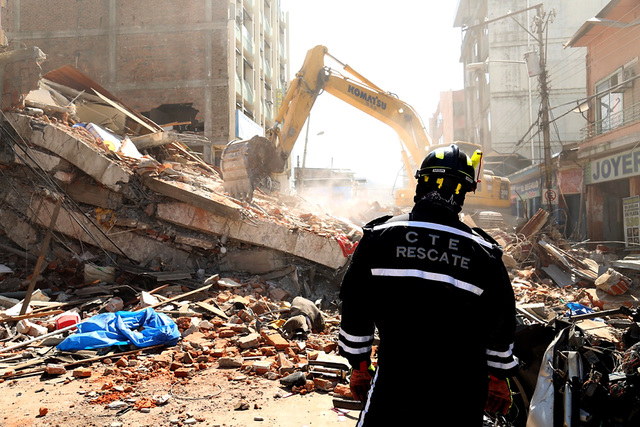PEDERNALES, Ecuador (AP) — Aid began to flow in Sunday to areas devastated by Ecuador’s strongest earthquake in decades and the death toll continued to rise as people left homeless hunkered down for another night outside in the dark. ADVERTISING
PEDERNALES, Ecuador (AP) — Aid began to flow in Sunday to areas devastated by Ecuador’s strongest earthquake in decades and the death toll continued to rise as people left homeless hunkered down for another night outside in the dark.
Officials said the quake killed at least 246 people and injured more than 2,500 along Ecuador’s coast. Vice President Jorge Glas said the toll was likely to rise because a large number of people remained unaccounted for, though he declined to say how many.
Much damage was reported in the cities of Manta, Portoviejo and Guayaquil, which are all several hundred kilometers (miles) from the epicenter of the quake that struck shortly after nightfall Saturday.
But the loss of life seemed to be far worse in isolated, smaller towns closed to the center of the earthquake.
In Pedernales, a town of 40,000 near the epicenter, soldiers put up a field hospital in a stadium where hundreds of people prepared to sleep outside for a second straight night. Downed power cables snaked across the streets with no prospect of electricity being restored soon, making it unsafe for many to return to their homes.
The town’s mayor said looting broke out Saturday night amid the chaos but with the arrival of 14,000 police and soldiers to towns in the quake zone the situation appeared more under control.
President Rafael Correa, who cut short a trip to Rome to oversee relief efforts, declared a national emergency and urged Ecuadoreans to stay strong.
“Everything can be rebuilt, but what can’t be rebuilt are human lives, and that’s the most painful,” he said in a telephone call to state TV before departing for Manta, where he arrived just before nightfall to be briefed by aides.
More than 3,000 packages of food and nearly 8,000 sleeping kits were being delivered Sunday. Ecuador’s ally, Venezuela, and neighboring Colombia, where the quake was also felt, organized airlifts of humanitarian aid. The European Union, Spain, Peru and Mexico also pledged aid.
Rescuers scrambled through ruins in the provincial capital Portoviejo, digging with their hands trying to find survivors.
“For god’s sake help me find my family,” pleaded Manuel Quijije, 27, standing next to a wrecked building. He said his older brother, Junior, was trapped under a pile of twisted steel and concrete with two relatives.
“We managed to see his arms and legs. They’re his, they’re buried, but the police kicked us out because they say there’s a risk the rest of the building will collapse,” Quijije said angrily as he looked on the ruins cordoned off by police. “We’re not afraid. We’re desperate. We want to pull out our family.”
Electricity mostly remained out in Manabi province, the hardest-hit region, as authorities focused on finding survivors.
“Compatriots: Unity, strength and prayer,” the vice president told a throng of people in Manta as he instructed them on how to look for survivors. “We need to be quiet so we can hear. We can’t use heavy machinery because it can be very tragic for those who are injured.”
On social media, Ecuadorians celebrated a video of a baby girl being pulled from beneath a collapsed home in Manta.
But fear was also spreading of unrest after authorities announced that 180 prisoners from a jail near Portoviejo escaped amid the tumult after the quake.
Shantytowns and cheaply constructed brick and concrete homes were reduced to rubble along the quake’s path. In the coastal town of Chamanga, authorities estimated than 90 percent of homes had damage, while in Guayaquil a shopping center’s roof fell down and a collapsed highway overpass crushed a car.



